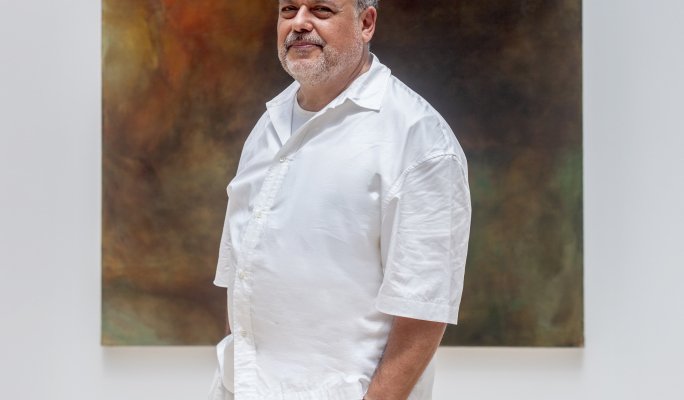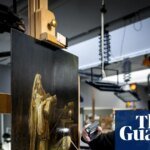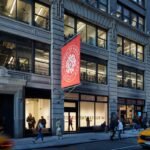
If a banana duct-taped to a gallery wall can command €6.2 million, the joke’s on the buyer, right? But more than that, Maurizio Cattelan’s prank is a jab at art markets that are fuelled by notoriety and speculation.
Yet against art’s co-option by spectacle, Maltese artist Anton Grech keeps up a defence of painting. Forged in the art schools of Florence and Düsseldorf, Grech’s return to Malta two decades ago brought home not just technique, but an ideology, and a profound shift in the way art is taught in Malta.
Countless university students drew from Grech’s well at his “enrichment course” at the Malta School of Art in Valletta up until 2008, when his pedagogical mission finally took root by founding the Department for Visual Arts within the Faculty for the Built Environment.
Grech’s foundation course today puts all architecture students through his wringer; his avowed aim “is to open their eyes” to the fundamentals of design. For the student it means learning composition, proportion, or colour.
But Grech adds that what they learn is how to conceive ideas in their mind, to then translate them and communicate them to the world. “The German word for this is ‘Gestaltung’,” he says, describing the process through which the creative process ultimately produces the shape or form of the artwork.
“But to be innovative, students must have the fundamental tools to be able to articulate their ideas. I help them discover where originality and creativity lie within – and not rely on the plagiarising of trends and fashion to imitate others.”
This is a deeply held conviction for Grech, 60, a painter and sculptor whose formation at the Accademia di Belle Arti di Firenze and later at the Kunstakademie Düsseldorf, unleashed an uncompromising, ideological artist who confidently abhors brazen self-marketing or hacks who propel themselves into sensations.
A rare interview like this at his Valletta home and studio, comes in the wake of MICAS’s ongoing exhibition The Space We Inhabit, the year’s finest showcase of Maltese artists – featuring Grech, Pierre Portelli, Joyce Camilleri, Austin Camilleri, Vince Briffa and Caesar Attard.
“Malta has historically always suffered from an isolation that prevented the germination of its talent,” Grech insists, believing island-smallness to have cultivated an undeserved tolerance for lowly imitation, and an artistic tradition impervious to the excellence demanded of artists overseas.
“Young artists who took the plunge in artistic centres abroad somewhat avoided this fate,” he says, in a rejoinder about his own training with the towering Gotthard Graubner, and working alongside icons like Markus Lüpertz. Those who stayed behind had to suffer the compromise of living by ecclesiastical commissions and portraits. Grech cites, among others, the frustrations endured by Raymond Pitrè – the recent subject of a MICAS exhibition – or how modernist pioneers like Gabriel Caruana had to settle for teaching posts that did not befit his prodigious talent. “Artists like Caruana mastered an idiom that accompanied them from beginning to end. That iconic authenticity kept him from falling victim to society commissions… at some cost.”
The provinciality and conservatism of island life suffocated many creative geniuses and their artistic liberty… it has been a serious predicament for those who struggle to create art
Anton Grech
In this deification of the artistic struggle, Grech is an evangelist for the rudimentary formation of artists who can create something original, which is why he believes in greater national investment, and institutions like MICAS, to further the visual arts.
“Artistic formation from the hands of professional artists, and the osmosis of creativity through peers, is like a protective girdle; of course, there’s a lot to be said about character – whether one believes in themselves or not – because you cannot sprout a flower under the canopy of greater artists… after mastering the fundamentals, young artists must find their own patch of the garden.”
But Grech says even the general public can learn to discern who an accomplished artist is in the morass of attention-seeking and performative contemporary arts.
“That inner struggle artists have to contend with, is a journey in which they finally find their language – the apex of their expression – and it leaves behind a legible crescendo,” Grech says; breadcrumbs for the rest of us, helping us read this voyage to artistic maturity.
Not so those who turn their nose up at artistic formation, Grech quips. “Young artists must be faced with professional criticism, which is why institutions need professional artists and contemporary learned critics who can stem the temptation of crass imitation.” Marcel Duchamp’s Fountain – the porcelain urinal ‘turned art by the artist’s choice’ – and the arrogance of just pointing at something to call it art, easily gets Grech’s dander up. “The venom of sensationalist art is like weedkiller, leaving behind a cemetery of artists who are trying to earn a living, because suddenly a monster is spawned and steals people’s attentions.”
For Grech makes no secret of the gulf that exists between art that is rooted in informed skill, and anything else.
“Ultimately drawing is reasoning. For someone to create an original form, to materialise what they visualise in mind, and to not copy precisely what they see or imitate – is to be capable of transmitting what they perceive, graphically. And it is this kind of engagement – the artist’s growth and development – that we must discern in their work.”
In a footballing analogy, Grech feels a lot of Maltese ‘Messis’ have lost out on their professional development because of a paucity of opportunities. “I am too conscious of the fact that the wrong type of education and policies, make it impossible to nurture the talent around us professionally… so if we talk about professionalising Maltese football teams for example, the aim is arguably to reach a footballing standard that takes us head-to-head with the European leagues.”
Grech believes that moment of ‘professionalisation’ has also arrived for art in Malta. “MICAS is that example,” he says. “The dam has broken.”
On one hand, he says MICAS has understood the thirst of the Maltese public that wants to see international art on our shores. “Consider that not once in a hundred years of British colonisation or neighbourly Italian friendship, have we ever been loaned a De Chirico, a Morandi, a Henry Moore or a Francis Bacon… surely enough none of our historic palazzi were designed to exhibit a painting on high standards. And now we have MICAS. Malta can realise now what it has been missing out on all these decades.”
This is also why Grech’s vast 3-metre canvasses today can enjoy the long-yearned generosity of space and light, thanks to MICAS’s Galleries.
Grech also sets much store by the contribution of MICAS’s artistic director, Edith Devaney, who for 20 years was senior curator at the Royal Academy of Arts in London, curating exhibitions by Jasper Johns and David Hockney among many greats.
“MICAS struck gold with the choice of Devaney, because her experience and expertise, and her encounters with Malta’s talented art world, have raised the standard – we are no longer playing around in a small pool. There’s a leak, and the water is flowing out into the ocean,” Grech says, believing the international energy MICAS attracts is what makes Maltese artists raise their game.
“Malta has never taken as seriously the development of contemporary art as it is doing today. Where could we have located the identity of the Maltese artist in all these past decades, except for the church paintings and portrait commissions, or as teachers of art in government institutions.
“These heavy shackles plagued many an artist,” Grech says. “The provinciality and conservatism of island life suffocated many creative geniuses and their artistic liberty… it has been a serious predicament for those who struggle to create art.”
Now he says Malta should not shy away from intensifying its investment in contemporary artistic development, and start trusting its finest practitioners in leading the way, and not simply deploy the technocrats to hand out government funds willy-nilly.
“I wholeheartedly believe in professional training… the masters who understands where genius lies, who knows how the power of early talents can be channelled. But if the game is all about merely funding applicants for grants, then it’s pen-pushers calling the shots. Talent before bullshit – that’s my maxim.”











